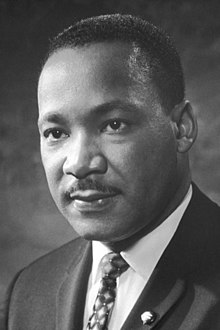
Martin Luther King%2C Jr..
(Image by Wikipedia (commons.wikimedia.org), Author: Nobel Foundation) Details Source DMCA
Duluth, Minnesota (OpEdNews) July 3, 2023: The white American Protestant theologian Gary Dorrien (born in 1952; Ph.D. in theology, Union Graduate School, 1989), an ordained priest in the Episcopal Church (1982), is a prolific scholar.
For example, he is the author of the trilogy about white American Protestant liberal theology, published by Westminster John Knox Press:
(1) The Making of American Liberal Theology: Imagining Progressive Religion, 1805-1900 (2001; for specific page references to personalism, see the "Index" [p. 488]);
(2) The Making of American Liberal Theology: Idealism, Realism, and Modernity, 1900-1950 (2003; for specific page references to personalist theology, see the "Index" [p. 657]);
(3) The Making of American Liberal Theology: Crisis, Irony, and Postmodernity, 1950-2005 (2006; for specific page references to personalist theology, see the "Index" [pp. 644-645]).
The Reverend Dr. Martin Luther King, Jr. (1929-1968; Ph.D. in theology, Boston University, 1955)), went to Boston University for his doctoral studies in theology precisely to study personalist theology under Edgar Brighton and other personalists there. In my estimate, King's personalist orientation is the key to understanding his spirituality of agape love and his practice of nonviolent social protest.
King's personalist orientation involves what the American Jesuit scholar Walter J. Ong (1912-2003; Ph.D. in English, Harvard University, 1955) refers to as belief "in" (a person), as distinct from belief "that" (a propositional statement is true), in his 1958 seminal essay "Voice as Summons for Belief: Literature, Faith, and the Divided Self" in the now-defunct Jesuit-sponsored journal Thought: A Review of Idea and Culture (Fordham University), volume 33, serial number 128 (Spring 1958): pp. 43-61.
Ong reprinted his 1958 seminal essay in his 1962 book The Barbarian Within: And Other Fugitive Essays and Studies (Macmillan, pp. 49-67); it is also reprinted in An Ong Reader: Challenges for Further Inquiry, edited by Thomas J. Farrell and Paul A. Soukup (Hampton Press, 2002, pp. 259-275).
Ong characterized his work as phenomenological and personalist in cast. However, I am not aware of even one reference to King in Ong's 400 or so distinct publications (not counting translations or reprintings as distinct publications).
Incidentally, in 1955, the year in which both King and Ong received his Ph.D., Dorrien turned three years old - and I turned eleven. Dwight Eisenhower was the Republican president of the United States, and the U.S. Supreme court had just made its famous 1954 decision in Brown v. the Board of Education in Topeka, Kansas - the state in which the seemingly avuncular President Eisenhower had been born and raised.
In relatively short order, King would step into the history books as the Baptist pastor of a church in Montgomery, Alabama, who preached and practiced the black social gospel and Gandhian nonviolent social protest, spearheaded the Montgomery bus boycott. By 1963, King was one of the most widely publicized Americans in the world, as Time magazine recognized by naming his "Man of the Year" in its first January 1964 issue. Later in 1964, King was awarded the Nobel Peace Prize - in the year in which he turned thirty-five. However, when he subsequently spoke out against the Vietnam War, which at the time many Americans supported, many of his white liberal supporters did not support him. His honeymoon with white liberals was over. In the meantime, riots by certain black Americans showed that his gospel of nonviolent social protest had not carried the day with them. There were also riots in certain cities after King's assassination in 1968.
From the fall semester of 1954 onward until he retired, Ong taught English at Saint Louis University, the Jesuit university in St. Louis, Missouri. Over his lifetime, he received his fair share of recognition and honors - for example, he delivered the prestigious Terry Lectures at Yale University in the spring semester of 1964, the expanded version of which was published as his 1967 book The Presence of the Word: Some Prolegomena for Cultural and Religious History (Yale University Press).
In the 1966-1967 academic year, Ong served as the Berg Visiting Professor of English at New York University. Also in 1966-1967, Ong was one of the fourteen members of the White House Task Force on Education that reported to President Lyndon b. Johnson in 1967. However, Ong was never named by Time magazine as "Man of the Year" - and his work was not lionized.
Because Ong was a Roman Catholic priest, and because both Ong and King addressed broad Christian and Jewish audiences, we should also note here that the Second Vatican Council (1962-1965) in the Roman Catholic Church was significantly re-orienting Catholic life in the early 1960s - about the same time when King was spearheading the black civil rights movement in the United States - and being named Time's "Man of the Year" and receiving the Nobel Peace Prize.
(Note: You can view every article as one long page if you sign up as an Advocate Member, or higher).




